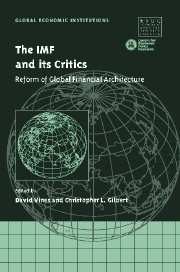Book contents
- Frontmatter
- Contents
- List of figures
- List of tables
- List of contributors
- Acknowledgements
- Introduction
- 1 The IMF and international financial architecture: solvency and liquidity
- 2 Progress towards greater international financial stability
- 3 International coordination of macroeconomic policies: still alive in the new millennium?
- 4 The Report of the International Financial Institution Advisory Commission: comments on the critics
- 5 Reforming the global financial architecture: just tinkering around the edges?
- 6 The IMF and capital account liberalisation
- 7 How should the IMF view capital controls?
- 8 The resolution of international financial crises: an alternative framework
- 9 Whose programme is it? Policy ownership and conditional lending
- 10 The IMF and East Asia: a changing regional financial architecture
- 11 The role of the IMF in developing countries
- 12 Argentina and the Fund: anatomy of a policy failure
- 13 Countries in payments' difficulties: what can the IMF do?
- 14 Accountability, governance and the reform of the IMF
- 15 The IMF at the start of the twenty-first century: what has been learned? On which values can we establish a humanised globalisation?
- Index
- References
13 - Countries in payments' difficulties: what can the IMF do?
Published online by Cambridge University Press: 04 December 2009
- Frontmatter
- Contents
- List of figures
- List of tables
- List of contributors
- Acknowledgements
- Introduction
- 1 The IMF and international financial architecture: solvency and liquidity
- 2 Progress towards greater international financial stability
- 3 International coordination of macroeconomic policies: still alive in the new millennium?
- 4 The Report of the International Financial Institution Advisory Commission: comments on the critics
- 5 Reforming the global financial architecture: just tinkering around the edges?
- 6 The IMF and capital account liberalisation
- 7 How should the IMF view capital controls?
- 8 The resolution of international financial crises: an alternative framework
- 9 Whose programme is it? Policy ownership and conditional lending
- 10 The IMF and East Asia: a changing regional financial architecture
- 11 The role of the IMF in developing countries
- 12 Argentina and the Fund: anatomy of a policy failure
- 13 Countries in payments' difficulties: what can the IMF do?
- 14 Accountability, governance and the reform of the IMF
- 15 The IMF at the start of the twenty-first century: what has been learned? On which values can we establish a humanised globalisation?
- Index
- References
Summary
Introduction
There are several different strands in the current economic literature regarding the role of IMF. In this chapter, I develop one particular theme, namely the role of the IMF in assisting countries that have serious international payments difficulties. One characterisation of this debate is that between the ‘moral hazard’ school and the ‘liquidity’ school. The former stresses the classic perverse incentive problem created with insurance-type interventions in capital markets leading lenders to bet on being ‘bailed out’ at some future date if things go wrong – especially in countries that might be considered ‘too big to fail’.
Adherents to this school point to the sheer size of IMF-led packages to emerging economies, the very low emerging-market spreads after the assistance to Mexico in 1995 and the ‘lending boom’ to emerging economies, including the Asian economies, that then followed as evidence of the potential importance of moral hazard. In figure 13.1, we plot the EMBI spread from 1994 as an illustration.
Some have labelled this as a ‘theory of plenty’: a theory of too much private lending, on the one hand, and too little discipline on the other. This lack of discipline might result in countries contracting large amounts of debt (either in the public or private sectors or in the private sector with implicit or explicit guarantees) while, at the same time, failing to address structural weaknesses or not adjusting quickly enough to negative shocks as they arise.
- Type
- Chapter
- Information
- The IMF and its CriticsReform of Global Financial Architecture, pp. 363 - 395Publisher: Cambridge University PressPrint publication year: 2004
References
- 1
- Cited by



